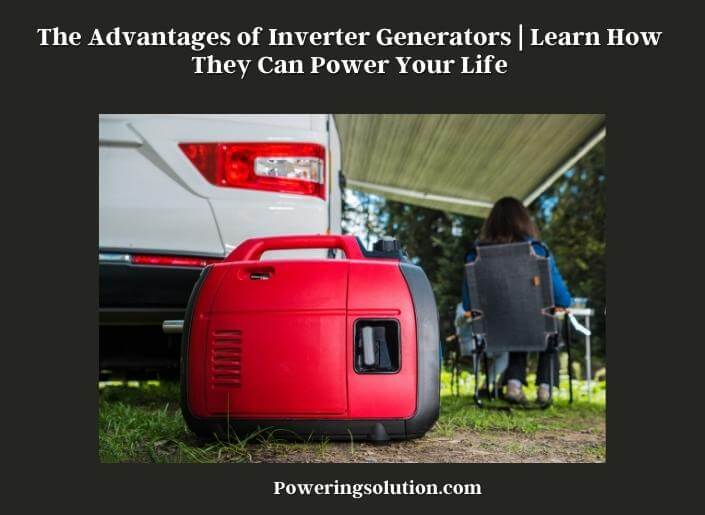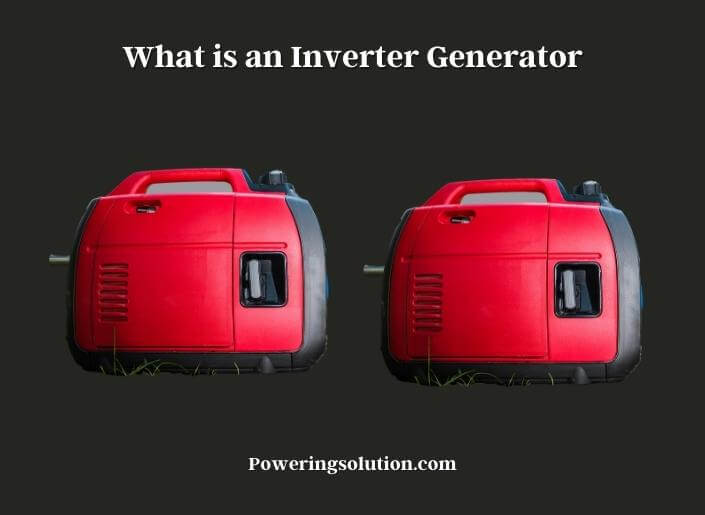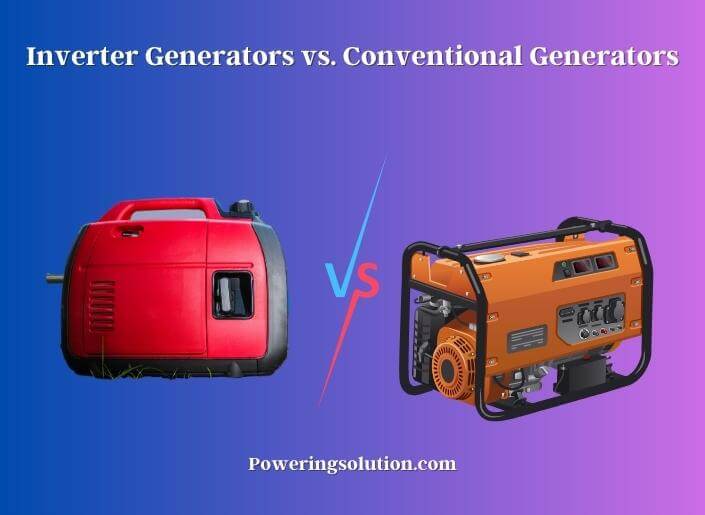If you’re looking for a reliable source of power that can keep your devices running, whether, during a power outage or outdoor activities, inverter generators are an excellent option. Compared to conventional generators, inverter generators offer numerous advantages such as efficiency, portability, quiet operation, and clean power output.

These generators are designed to produce clean, stable, and high-quality power, making them ideal for powering sensitive electronic devices.
What is an Inverter Generator?
An inverter generator is a type of generator that produces high-quality AC power by first converting DC power into AC power. This process is accomplished using a special electronic circuit that ensures the power output is clean, stable, and safe for use with sensitive electronic devices.
Unlike conventional generators that run at a constant speed, inverter generators are designed to adjust their engine speed based on the power demand, which helps to reduce fuel consumption, noise, and emissions. Inverter generators are a great choice for powering a wide range of electronics, from small appliances like phones and laptops to larger devices like refrigerators and air conditioners.

Advantages of Inverter Generators
There are several advantages to using an inverter generator over a conventional generator. Inverter generators are designed to be highly efficient, producing more power per gallon of fuel than conventional generators. This means you’ll spend less money on fuel costs and produce fewer emissions, making them more environmentally friendly.
Most inverter generators are compact and lightweight, making them easy to transport and store. They’re an excellent option for outdoor activities like camping, tailgating, and RVing, as well as for use as a backup power source for your home.
Inverter generators are much quieter than conventional generators, thanks to their advanced engine technology and soundproofing materials. This makes them ideal for use in residential areas or anywhere where noise is a concern.
Inverter generators produce clean, stable power that’s safe for use with sensitive electronics like laptops, smartphones, and TVs. The power output is less likely to fluctuate, which can help to prolong the life of your devices and prevent damage.
Because inverter generators are more fuel-efficient and produce fewer emissions, they’re considered to be more eco-friendly than conventional generators. This is especially important if you’re using your generator for an extended period of time or in areas where air quality is a concern.
Inverter Generators vs. Conventional Generators
While both inverter generators and conventional generators can provide power during an outage or for outdoor activities, there are some key differences between the two.
Power Output
Conventional generators are designed to produce a fixed amount of power, typically ranging from 5,000 to 15,000 watts. Inverter generators, on the other hand, are available in a wider range of sizes and can produce anywhere from 1,000 to 10,000 watts of power. This means you can choose a generator that’s sized appropriately for your needs, whether you need to power a few small devices or an entire home.

Fuel Efficiency
Conventional generators are generally less fuel-efficient than inverter generators, meaning they consume more fuel for the same amount of power output. Inverter generators use advanced engine technology and electronic circuitry to adjust the engine speed based on the power demand, which helps to optimize fuel consumption.
Noise Level
Conventional generators are typically louder than inverter generators, with noise levels ranging from 60 to 100 decibels (dB). Inverter generators are much quieter, producing noise levels that range from 50 to 70 dB, which is about as loud as a conversation.
Portability
Conventional generators tend to be larger and heavier than inverter generators, making them less portable. Inverter generators are designed to be lightweight and compact, making them easy to move around and store.
Clean Power Output
Inverter generators produce a cleaner, more stable power output than conventional generators, making them safer for use with sensitive electronics. Conventional generators produce a “dirty” power output that can damage electronic devices or cause them to malfunction.
How to Choose the Right Inverter Generator?
Choosing the right inverter generator for your needs can be a daunting task, but here are some factors to consider:
Power Output: The first thing to consider when choosing an inverter generator is how much power you’ll need. Make a list of all the devices you’ll want to power, including their starting and running wattage requirements. Choose a generator that can handle the highest starting wattage requirements on your list to ensure you don’t overload the generator.
Fuel Efficiency: Next, consider how long you’ll need the generator to run and how often you’ll need to refuel it. Look for a generator with a fuel tank that’s large enough to provide the runtime you need, but not so large that it makes the generator too heavy or bulky to move around. Also, look for a generator with a fuel-efficient engine that can help you save on fuel costs over time.
Noise Level: If you’ll be using your inverter generator in a residential area or another noise-sensitive environment, the noise level is an important consideration. Look for a generator with a low decibel rating (ideally under 60 dB) for quiet operation.
Portability: Consider the weight and size of the generator if you’ll need to move it around frequently or transport it for outdoor activities. Look for a generator that’s compact and lightweight, with built-in handles or wheels for easy maneuverability.
Brand Reputation and Warranty: Finally, consider the reputation of the brand you’re considering and the warranty offered. Choose a reputable brand with a good track record for quality and customer service. Look for a warranty that covers the generator for at least 2-3 years to protect your investment.
If you learn about a diesel generator for long-lasting and efficient power solutions, click here for the details.
Common Questions & Response
Can I Use an Inverter Generator to Power My Entire Home During a Power Outage?
While inverter generators are great for powering small electronics and appliances, they may not have enough power output to run your entire home during a power outage. It’s best to consult with an electrician to determine what size generator you’ll need to power your home.
Can I Connect Two Inverter Generators Together to Increase Power Output?
Yes, some inverter generators can be connected together in parallel to increase the power output. However, you’ll need to use a parallel kit that’s specifically designed for your generator model to ensure safe operation.
How Long Can an Inverter Generator Run on a Single Tank of Fuel?
The runtime of an inverter generator depends on several factors, including the size of the fuel tank, the power output, and the load placed on the generator. Some generators can run for up to 10-12 hours on a single tank of fuel, while others may only last a few hours. Check the manufacturer’s specifications for more information on runtime.
Can I Run My Inverter Generator Indoors?
No, it’s not safe to run any type of generator indoors. Generators produce carbon monoxide, which is a colorless, odorless gas that can be deadly. Always run your generator in a well-ventilated outdoor area.
Are Inverter Generators More Expensive Than Conventional Generators?
Inverter generators can be more expensive than conventional generators, but they also offer several advantages, such as fuel efficiency and quiet operation. You’ll need to weigh the cost against the benefits to determine what’s right for your needs.
Final Verdict
Inverter generators offer several advantages over conventional generators, including fuel efficiency, quiet operation, and portability. By choosing the right inverter generator for your needs and properly maintaining it, you can ensure reliable power for all your outdoor activities or emergency power needs.
Keep in mind that safety should always be a top priority when using a generator, so be sure to follow all manufacturer’s instructions and never run your generator indoors. With the right inverter generator, you’ll have peace of mind knowing that you’ll have power when you need it most.
